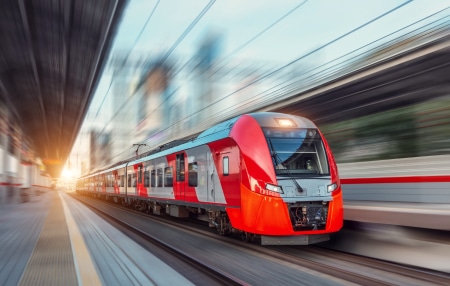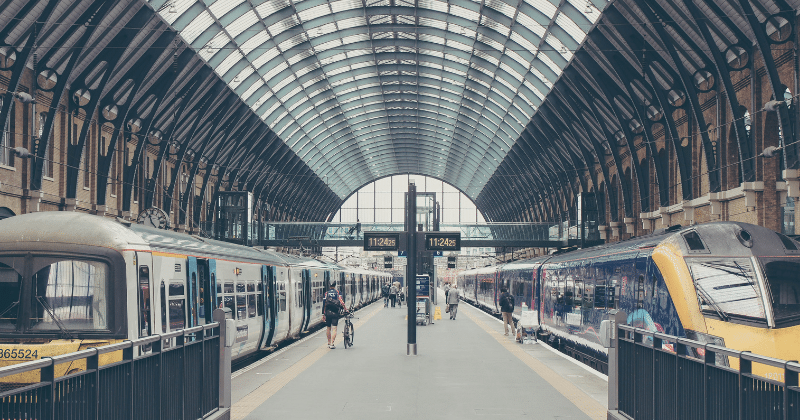
Single Train Tickets vs Returns
When you see an offer being plugged for cheap travel, it usually goes along the lines of ‘Cheap Away Day Returns.’ Rarely, if ever, do the ads promote ‘Cheap Away Day Singles’, presumably working on the assumption that, wherever you’re going, you want to get back home at some point.
So, when you’re booking a train journey is it always cheaper to buy a return ticket, or can two single tickets work out cheaper?
Returns should be better value, but often aren’t. It’s very common that cheaper fares are available by getting two single tickets rather than a return ticket, so be sure to check.
The price you pay for your ticket also depends on a few things:
- How far in advance you book your ticket
- The route, date and time you’re travelling
- The type of ticket you’re buying
Save £288.40 on a London to Manchester return
For instance, searching for a round-trip ticket between London and Manchester revealed a standard anytime return ticket priced at a hefty £369.40. However, a quick check showed that the same journey could be made with an outbound advance single ticket costing £47.50 and an inbound ticket at £33.50, all without any discounts or railcards applied.

How to get the cheapest train tickets
To secure the cheapest train tickets in the UK, it’s best to book in advance, travel during off-peak hours, and use a railcard if eligible. Additionally, comparing prices across various platforms can lead to better deals.
Below is a list of ways that can help you cut the costs on your travel.
1. Buy a Railcard
Railcards typically reduce the fare by one-third. They can be purchased on the Railcard website as well as on platforms like Trainline and Trainpal. Most railcards are priced at £30 per year, with a three-year option available for £70. Therefore, if you spend over £90 annually on train travel, investing in a railcard is beneficial.
A variety of railcard options are available, including:
- 16-25 railcard
- Senior railcard (for those aged 60 and over)
- Two together railcard
- Disabled persons railcard (£20 for one year, £54 for three years)
- 26-30 railcard
You no longer need to carry a physical railcard. Digital versions can be saved on your smartphone or tablet for convenience.
2. Tools to find split tickets
So, what is split ticketing? Split ticketing is used to save money on train fares. Instead of buying a single ticket for the entire journey, passengers purchase multiple tickets for different segments of the same trip. Despite splitting the tickets, passengers often remain on the same train and in the same seat for the whole journey.
- TrainPal – Voted as the cheapest overall, TrainPal is a digital platform that lets you book train tickets in the UK and across Europe. It offers features such as split ticketing, which can help users find cheaper fares by splitting their journey into multiple tickets instead of buying a single one.
- Split My Fare and TrainTickets.com – Split My Fare charges 15% of your savings, while TrainTickets.com charges 10%. Both services are fast and efficient, typically taking only a few seconds to find fares and clearly displaying results and savings. They offer tickets for all non-season tickets.
3. Book weeks ahead to secure the lowest fares
If you’re wondering “how far in advance can I book train tickets”, it’s best to start looking for tickets around 12 weeks before you want to travel, in order to get the best deal.
If you know your travel dates and destination, there’s a clever trick to be first in line for cheap tickets. Enter your journey details into the Trainline ticket alert system, and you’ll receive an email when advance tickets for that route become available. To avoid fees, book through a train-booking site that doesn’t charge additional costs.
Can you get a refund on train tickets?
Each operator has different rules.
For example, with National Rail you can get a refund for your unused train ticket, with no fees, if your train is delayed or cancelled and you decide not to travel. If you want a refund for another reason, you may have to pay a fee.
TrainPal’s ‘Flexible’ tickets are refundable, however, the Advance tickets can only be changed. And if you have a combination of Advance and Flexible tickets, then all of the tickets can be changed.
What about if my train is cancelled or delayed?
Each operator has different rules, but most will compensate for delays of 30 minutes or more, several will pay after just 15 minutes. Most operators follow a Delay Repay policy, with compensation of 50% of the fare regardless of the cause of delay.
However, some train companies still use an older compensation scheme, which means they might not pay if the delay was beyond their control, such as track fires or strikes.
If you’re looking for more ways to cut back on costs, here’s 5 Tips for Saving on Your Weekly Shop.

